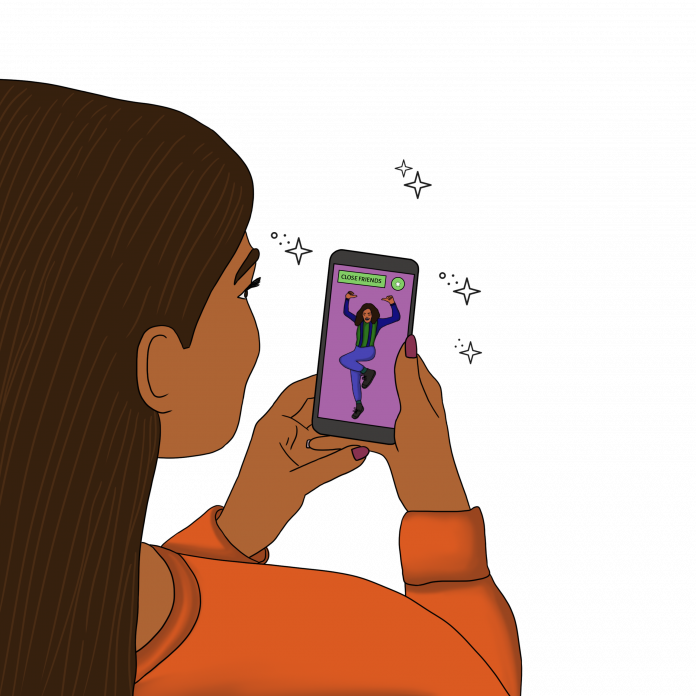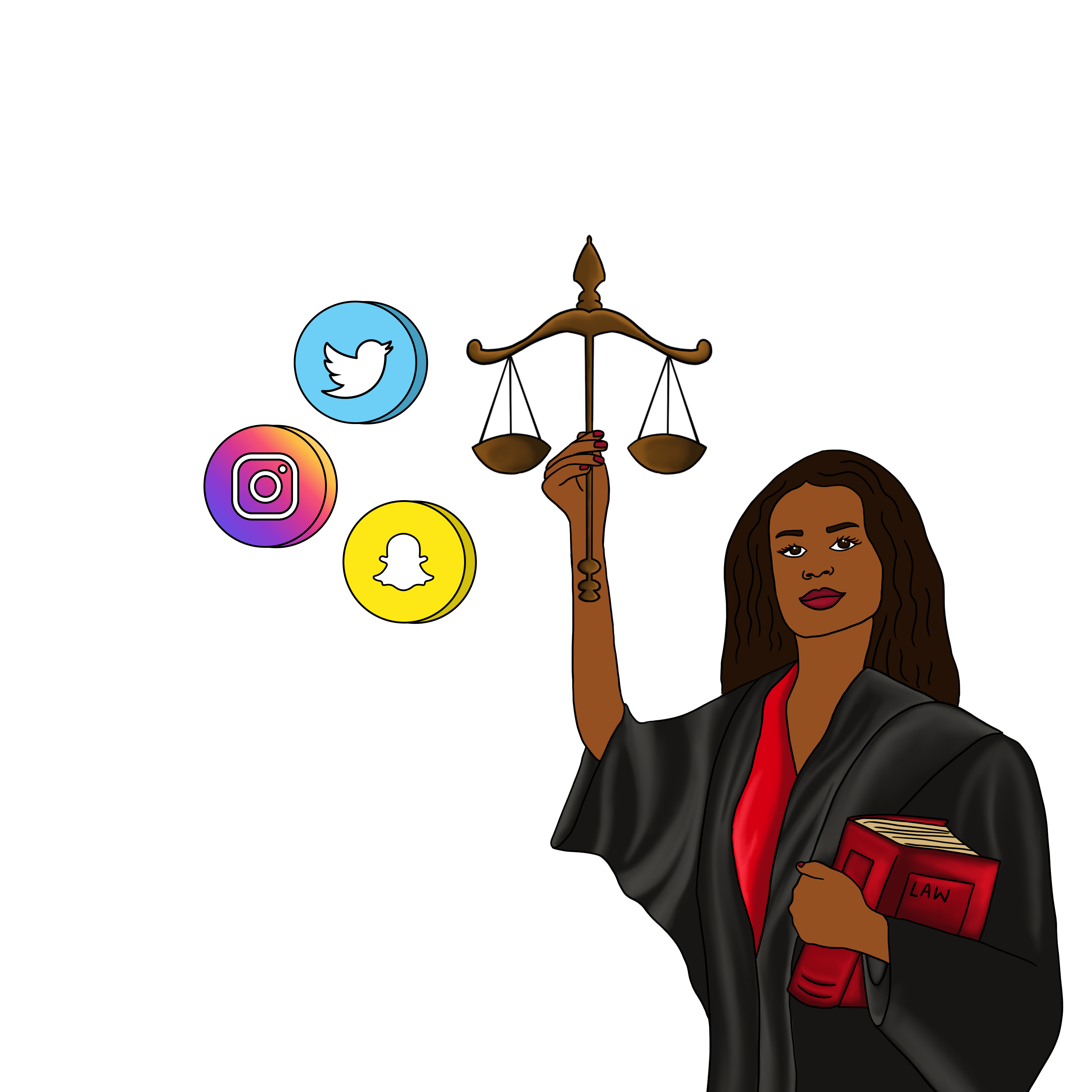By Hija Kamran
As she goes out on a drive with her boyfriend, Muzna* routinely shares updates from her dates after work on her Instagram Stories only to be viewed by a selected few people on her Close Friends list. The 26-year-old marketing professional from Karachi says that she finds it safer to control who gets to view her stories about her dating life. “Since I can’t openly talk about my relationship because of my conservative family, I’m allowing only a few people who I trust to see the most private parts of my life. I think it’s mostly because I’m scared of my family finding out about him before the time is right, but also because of the [fear of] judgement of the people.” She adds, “As much as I don’t want ‘log kya kahengay?’ to define my life, I happen to give it a lot of importance because I know not caring would mean giving up on some of the things that make me happy.”
Women always find themselves negotiating the freedoms that they are allowed to enjoy in Pakistani society. Where someone would be forced to carry a dupatta to get permission to work, others would schedule hangouts with friends according to the moods of their family. Similarly, what gets on a woman’s social media is also dictated by who is watching the content she posts and who is judging it: “It’s like everyone is keeping an eye on what I’m posting,” Muzna* shares, recalling an incident where someone sent her photos with her boyfriend she uploaded on Facebook to her sister, leading to a list of restrictions and increased surveillance in her own house. “In a way, I think Instagram Stories lets me choose who I share my stories with, and the fact that the stories disappear after 24 hours is also a relief for me.” She adds that because her photos were copied from Facebook and sent to her family, she stopped sharing private updates on her profile. “I shared my photos with a Custom list. But even though I knew who copied my photos, I just think it was better to not leave anything out there for longer than 24 hours.”
On the internet, Pakistani women find themselves making small pockets of safe spaces wherever they find an opportunity, and this comes as a response to the ever-growing violence that they face within and outside their homes. From being denied access to the internet and digital devices by the family to non-consensual use of images to fake profiles and hacking and blackmailing, women have found themselves at the center of gender-based violence online as much as they have been targeted with this abuse offline, and this perpetual cycle of violence leads to them negotiating “safe spaces” amongst their communities. However, when the reason is not fear of abuse, these safe spaces emerge from the sense of not being judged for personal choices and lifestyles in a society that thrives on moral policing and scrutinising every aspect of a woman’s presence on the internet.
In an attempt to find these safe spaces, women looking for them naturally turn to social media — platforms that come in many forms with layered nuances of their own. Facebook, for instance, has enabled women to seek a sense of community in the many groups that have been formed over the years. However, owing to the large number of members in these groups, they quickly turn into ones where women often find themselves walking on eggshells out of fear of being judged, misunderstood or becoming subject to criticism rooted in internalised misogyny.
In a sense, this fear seems to be less of a concern for those actively building their own curatable list of Close Friends on Instagram that enables the user to decide who gets to see the exclusive stories for the next 24 hours. Introduced in late 2018, the Close Friends list on Instagram quickly became a hub for women to share a more raw and real reflection of their lives.
Rabia*, a 28-year-old content writer who manages a public Instagram profile, says that for her, “Close Friends on Instagram is not a list for actual close friends, but for the people you know you can trust with your private life details. For me, it’s an effort to build my own little judgement-free zone on the internet.” She adds, “For example, I don’t have two of my close friends in my Close Friends list, because they have views different from mine, and when I post stories on this list, I don’t want anyone to give me a lecture on what is acceptable for a woman to do and what is not.” Rabia, who I briefly met once in a professional capacity at an event, has me added to her Close Friends list where she routinely uploads stories of trying to perfect a dance step, being at a party, failing to roll the paper or sharing her thoughts about life and death. She explains, “I’m a very different person professionally and most of my colleagues don’t see this side of me. But the reason I added you to this list is also because I know that I won’t be judged or lectured.”
The prevalent moral policing in Pakistani society has significantly scarred women, leading to them forming various versions of themselves customised according to the groups they occupy and individuals they meet, never fully expressing their full personalities at once. The fear of ‘what will people say?’ defines the choices that women make and how they express themselves in public, and hence the need for closed safe spaces curated and controlled by them becomes a liberating avenue to be themselves, and mirror all the versions of their personality as much and as often as they like.
Rabia* says that just being on the internet is an act of rebellion in itself for women that comes with a constant sense of insecurity and a fear of being subjected to uncalled-for judgement and hate. “Why do I have to change or censor myself because someone on the internet does not like the choices I make for myself? In an ideal world, I would want to normalise the things I post on my Close Friends list for every woman, but we clearly don’t live in that world right now,” she shares. Rabia* has her family, including her sisters and cousins, added to this list on her account, and says, “My concern is not my family, because I don’t mind them commenting on what I do because I’m doing this alongside them. My concern is those people in my friends circle who would pass around my content for their own gossips and my character assassination. I just don’t feel safe.”
Unlike Rabia*, Muzna* thinks she cannot let her family be part of her Close Friends list yet owing to her experience of being restricted to meet friends and go out when her family was sent her photos. “I struggled to even get permission to work after graduating. My sister told me that I only wasted the money that my dad spent on my education because I’m a kharaab larki (of bad character).” she said, adding, “I had to make a lot of adjustments and a lot of compromises for a year like not making plans with friends or only using my phone to call in front of a family member, until they finally allowed me to get an internship, only because someone thought it was ok for them to breach my privacy. I had to prove my character to my family.”
Close Friends list allows Muzna* to share the versions of her life that she cannot share with her family. Salwa Rana, a lawyer from Islamabad and an avid social media user, says that the ability of controlling who gets to see the content you post on the internet “is liberating for women who find themselves being subject to scrutinising eyes of those around them.” She adds, “Most of the time, this scrutiny starts from within our homes: ‘sit properly,’ ‘wear your dupatta,’ ‘don’t be friends with the boys,’ is not a very good start for a lot of women in desi households. So when we get a space to express ourselves the way we like, away from the harsh scrutiny from our inner circle, we will take it.”
Salwa draws an interesting comparison between the use of Close Friends lists by men and that of women, and informs, “I see men on my Instagram posting photos with their wives on their Close Friends list, while openly posting about their parties and hangouts for everyone because partying is an expected behaviour of men, but something that we associate with a ‘bad woman’. We never tell men how a good man behaves. Instead ironically, the stereotypical ideas of good character like only associating and hanging out with family or your spouse that we impose on women are exhibited by men in private, while women must channel these characteristics at all times as a default if they want to be safe from many kinds of patriarchal oppression.”
However, Salwa agrees that these experiences vary for everyone, and just like Rabia*, she says that many households and social circles have normalised behaviour and activities that the larger population in the country considers forbidden for women, “but the reality remains, most women live with hundreds of restrictions, where just an act of meeting a friend can become a scandal.”
While the Close Friends list gives a sense of freedom to women, there is still always a looming fear of screenshots being taken and used to judge, bother or blackmail them, much like on the rest of the internet. According to Salwa, this is a gamble that women make to be visibilised on the internet and in public spaces. “In my opinion, we have been dehumanised and forced to be invisible in public for so long because of regressive cultural beliefs that, to a certain extent, we have made peace with what may come as a consequence of marking our individuality in the world.”
The ever-prevalent violence against women on the internet has conditioned them to consider it part and parcel of being a gendered body on a public platform. No level of privacy is ever enough to ensure safety from the many nuances of gender-based violence and unexpected ways this violence is inflicted on them, especially when the threat also exists within the close social and private circle. Rabia* says that while she considers herself privileged to be able to share her intimate and personal life with her family and friends, she acknowledges that hers is not a common experience of most women.
Close Friends list has become an avenue for these women to be vocal about the aspects of their lives that they have been forced to be silenced about. The conversations that are forbidden to be had in the open see the light of day in these closed and controlled spaces while maintaining a persona that is acceptable for the majority of the people in their circle. This censorship is not just the kind that Muzna* and Rabia* are trying to challenge that pertain to sharing content that most would agree to be controversial like intimate relationships and dancing; in fact, in a lot of cases, even the expression of overt feelings like sadness are forbidden to be shared in public. The stigma attached to sadness, grief, discomfort and any other feeling that is not happiness or anger forces people to express them in privacy, away from the public eye. So when women curate a space that they can control, they find it liberating to challenge these taboos, and this is how Zainab Mubashir, a freelance writer from Lahore, makes use of her Close Friends list on Instagram. As she navigates the internet, she finds it increasingly difficult to be able to be raw about her emotions. “I have added about a quarter of my followers to my close friends list. Most of them are women, though I don’t know all of them [in real life]. Not all of them are necessarily my friends, but they’re people I’m comfortable enough to be vulnerable with.” Zainab says that when she started posting on the Close Friends list on Instagram, she mostly shared her problems or would post videos of her venting or crying. “I don’t necessarily share my exact problem but I have shared moments of vulnerability, like where I’m talking about my mental health, or feelings of hurt. I’ve shared crying pictures and videos. The audience is mostly the people who I feel can relate to me or my concerns/insecurities.” She adds, “I only talk about my body, weight, and body image issues in my Close Friends stories. I wouldn’t [do it] on regular stories because it feels like putting too much of myself out there.”
Zainab uses the Close Friends stories to “vaguely post about my significant other, or pictures from places or experiences I don’t want to or can’t disclose to family.” She agrees that a lot of people use the Close Friends list to post things they would like to share openly, but cannot out of fear of judgement and more serious consequences. “Most of my mutuals use it to post pictures where they are dressed “immodestly” by our societal standards, or are partying with their friends. For women, even something like a picture with a cigarette or guy friends would usually go in the close friends list.” However, much like Salwa, Zainab shares that men who have her added in their Close Friends list would “usually [post] something like a shirtless picture or maybe [doing] some partying/drinks/drugs.”
Salwa says that the need for women to share vulnerable thoughts in a closed space arises because, much like other aspects of their personality, women have not been given liberty or confidence to share them in public. “This is honestly an attempt to unlearn and undo the damage that the patriarchy has caused and forced women to be silenced. The expectation to continue to be happy in every situation so you don’t come off as an ungrateful person, has really damaged how we perceive basic human emotions like sadness and grief,” she says, adding, “Of course women will upload stories of themselves crying for those people to see who they consider safe to be around. It takes a lot of courage to be vulnerable when it should not be this hard.”
Collectively, access to the internet and the many tools it offers may seem to be less significant, but gendered access to these tools reveal that each feature on every platform has a critical implication on the way these tools are accessed and used on an individual and community level. For a platform to be truly inclusive, it has to respect the many nuances that the gendered access needs. With increasing gender-based violence on the internet, features like Close Friends on Instagram are proving to be a safe, non-judgmental space for women to be all of their personalities at once.
*Names have been changed to protect identity.






